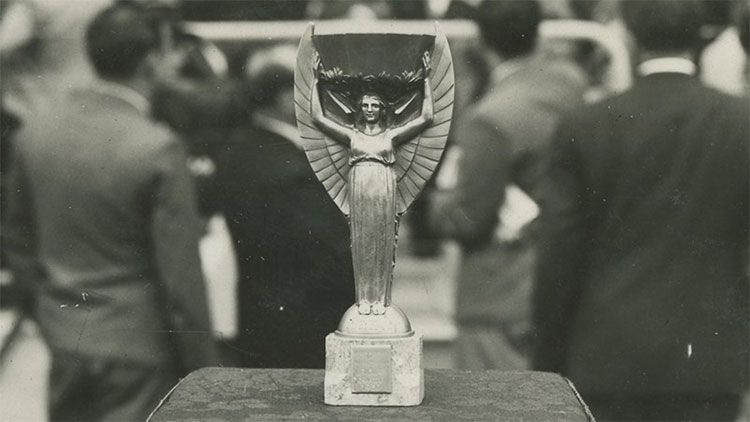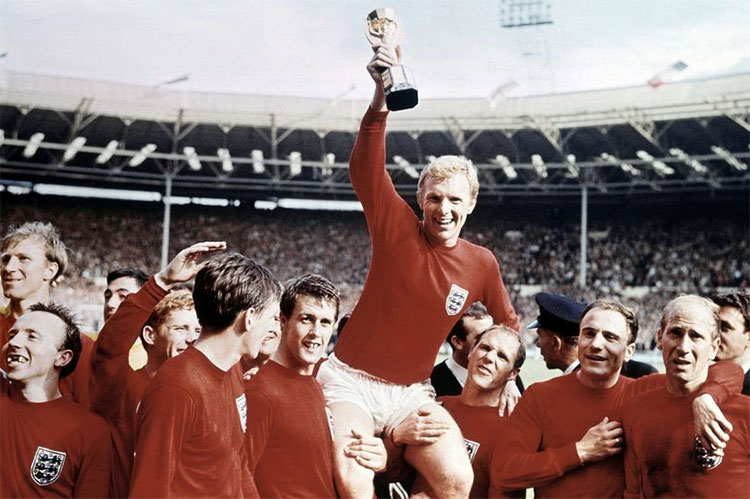The fate of the miserable World Cup gold cup
Having to lie under the bed, stolen and then found by a dog, but then the prestigious gold trophy continues to suffer from "depression".
Since the start of the World Cup tournament, FIFA has announced that it will award the Victory trophy to any team to win the championship. The gold-plated silver cup nearly 31cm tall is considered an invaluable symbol for the winning team.

Jules Rimet is the first trophy in the most fascinating league history on the planet.
The first World Cup tournament in 1930 honored the Uruguayan home team and the statue also stayed in the country after the tournament ended.
Four years later, the trophy was handed over to Italy - the team that won the World Cup twice in the second and third periods. The World Cup was no longer held because World War 2 broke out.
FIFA vice president Ottorino Barassi secretly took the statue hidden under the bed at his home, in a shoe box. This effort helps the trophy from the wave of war.
By 1946, the trophy was renamed Jules Rimet , after the name of FIFA president in the period 1921-1954. Rimet is the founder of the most exciting tournament on the planet.
History theft

The only England team once lifted the Jules Rimet trophy in 1966.
According to the Mirror, in March 1966, the stolen Jules Rimet trophy was displayed at an exhibition center in the UK - the host of the 1966 World Cup.
The thief took the trophy worth about $ 14,000 and left many other valuable things. The suspect was determined to be around 30 years old, of medium height with thin lips, black hair and scar on his face.
The case of a break in the FIFA context tries to resolve the crisis by ordering goldsmiths to make an identical copy.
A few days later, a thief broke out when FIFA President Joe Mears received a extortion letter.
"Hello Joe. I'm sure you're sitting still in search of the World Cup gold cup. For me, it's just like a pile of scrap gold ," the letter said.
The sender requests a ransom of more than $ 19,000. To believe it, the man said he would send a parcel with a removable lid of the cup to Stamford Bridge at Chelsea.
The incident became a chase between the thief and British police. But it is worth mentioning that the thief, though arrested, still did not reveal the place where the gold trophy was hidden.
A few days later, the trophy was found by chance in the south garden of London by a dog named Pickles. This dog was later awarded a medal; appeared on the BBC's popular television program and was offered free food for life. The owner of the dog is also given £ 6,000.
The mystery surrounding the trophy's whereabouts is still a mystery without explanation.
The World Cup gold cup disappears forever
Brazil team in general and captain Carlos Alberto in particular are the last team to have the opportunity to raise the gold trophy Jules Rimet in 1970.

The captain of the Brazilian team celebrated the championship trophy in 1970.
Brazil then won the World Cup three times and had the right to keep the original version forever according to the late FIFA President Jules Rimet.
But the trophy was stolen again in Rio de Janeiro in 1983. That's when a group of bandits secretly attacked the building. After controlling the guards, they broke the wooden frame, then hastily brought the precious statue.
The State Bank of Rio de Janeiro had a huge reward for the trophy carrier to return safely.
The president of Brazilian Football Federation Giulite Coutinh then called on the people: "The spiritual value of the statue is much bigger than the real value. The thieves have no patriotism."
But people no longer see the Jules Rimet trophy again. The achievement of the trophy so far is still a mystery. It is said to have been melted.
The gold trophy replaces the FIFA World Cup Trophy named after the 1974 World Cup finals. This trophy brings a lot of luck to Germany, when the national team raised the trophy three times in 1974, 1990 and 2014. .
- What's special about the World Cup gold cup?
- The most gold reserves in the world
- Interesting little things about gold
- Find the world's largest monolithic gold ingot in Russia
- The most miserable pregnant lizard in the world
- The world's 10 largest gold producers
- Gold is formed like?
- The interesting thing about gold may be unknown to you
- Why do we like gold?
- Small gold is super expensive
- Difficult questions: How much gold is in the sea?
- Found the oldest 4,500-year-old gold antiquity in the world
 'Fine laughs' - Scary and painful torture in ancient times
'Fine laughs' - Scary and painful torture in ancient times The sequence of numbers 142857 of the Egyptian pyramids is known as the strangest number in the world - Why?
The sequence of numbers 142857 of the Egyptian pyramids is known as the strangest number in the world - Why? History of the iron
History of the iron What is alum?
What is alum?